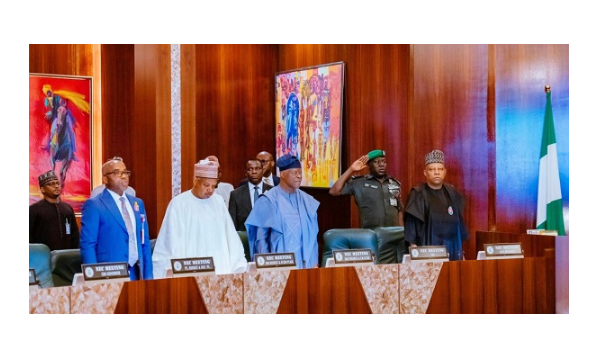
After receiving briefing on the Tax Reform Bill, the National Economic Council (NEC) yesterday urged its withdrawal from the National Assembly to allow for wider consultations.
The Executive Bill designed to comprehensively reform the tax system, was last week sent to the federal lawmakers for consideration and passage.
But governors and traditional rulers from the North, kicked against the portion of Value Added Tax (VAT), which in their estimation is skewed against the North.
Their position sparked controversy around the Bill despite Federal Government insistence that it is fair to all.
They rejected the proposed derivation-based model for VAT distribution.
At yesterday’s 145th NEC meeting chaired by Vice President Kashim Shettima, Chairman of the Presidential Committee on Fiscal Policy and Tax Reforms, Taiwo Oyedele, explained the motivation and merits of the bill to the Council.
Oyo State Governor Seyi Makinde, who made known the resolutions of the meeting, said NEC members resolved to push for consensus building.
He said the NEC also requested for more time to enable Nigerians gain a fuller understanding of the Bill.
Makinde said the withdrawal of the bill would allow room for more consultations and engagement.
He said: “The Council acknowledged that the country is under performing on all indices as regards yields from major revenue sources; also tax to GDP ratio and so on.
“So, after extensive deliberations, NEC noted the need for sufficient alignment between and among the stakeholders for the proposed reforms.
“Council therefore, recommend the need to withdraw the bill currently before the National Assembly on tax reforms, so that we can have wider consultations and also build consensus around these reforms, for the benefit of the entire country, and also to give people, for them to know the vision and where we are moving the country in terms of a tax reform, because there’s really a lot of miscommunication, misinformation.
“So, the bill will be withdrawn from the National Assembly and then, there will be consultations afterwards.”
NEC also approved the “Solutions for Internally Displaced and Host Communities” programme, presented by Hajara Ahmed, Project Coordinator for the World Bank-supported initiative.
The Minister of Budget and Economic Planning, Atiku Bagudu, who also spoke with reporters after the meeting, said the initiative would address the long-term needs of internally displaced persons (IDPs) through improved access to basic services and economic opportunities.
He said the programme would focus on investment in resilient infrastructure and support for host communities to foster sustainable livelihoods.
The minister said states are expected to appoint focal persons to facilitate communication with the Federal Ministry of Budget and Economic Planning, which will oversee project implementation alongside the National North East Development Commission.
Bagudu said: “The initiative seeks to develop robust infrastructure that can withstand future challenges, including improvements in essential services such as water supply, sanitation, and transportation. These enhancements, he said are crucial for supporting both IDPs and the communities that host them.
“In addition to infrastructure development, the programme, Bagudu added emphasizes the need for support for host communities. Recognizing that these communities face significant challenges, the initiative aims to provide necessary resources to help them foster sustainable livelihoods.
“By addressing the needs of host communities, the program seeks to create an inclusive environment where both IDPs and local residents can thrive together.
“The initiative focuses on strengthening project management and policy implementation.
This involves enhancing the capabilities of local governments and community leaders to effectively manage resources and tailor interventions to meet the specific needs of both displaced populations and their hosts.”